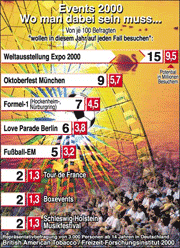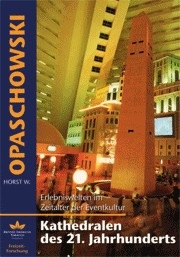Cathedrals of the 21st century
EXPO, Nürburgring and Oktoberfest. The German mega-events of the year 2000
Where is the most happening in the year 2000? Where do you simply "have to" be there? In the age of event culture, three major events set the tone and trend: The EXPO, Formula 1 and the Oktoberfest. 15 per cent of the population are already determined to "definitely" visit the EXPO 2000 world exhibition in Hanover, 9 per cent the Oktoberfest in Munich and a further 7 per cent the Formula 1 races at the Nürburg or Hockenheimring. This is the result of a recent representative survey of 3,000 people aged 14 and over, in which the British American Tobacco Leisure Research Institute analysed visitor interests in the areas of culture, sport and entertainment.
"A race for adventure worlds has begun," says Prof Dr Horst W. Opaschowski, Director of the Institute. "In Germany alone, there are 220 theme parks, 8,800 exhibitions and more than 10,000 public festivals. Life means experiencing more and more so as not to miss anything." EXPO 2000 is the first global event of the new millennium that can only be experienced "once in a lifetime". Up to 40 million people from all over the world are expected to attend. Then there are the Olympic Games, the European Football Championships and the Holy Year in Rome. More and more modern pilgrimage centres for experience consumers are spreading around the world. The experience-hungry consumers are pressed for time and money.
Events in the fields of culture, sport and entertainment are received very differently by different population groups. At the Schleswig-Holstein Music Festival, there are four university graduates for every potential visitor with a secondary school or primary school education, who on the other hand are underrepresented as visitors to leisure parks. This year, men are particularly keen to attend the Formula 1 races and the European Football Championships. The Love Parade in Berlin, on the other hand, has a clear youth cult character: one in four 14 to 19-year-olds is keen to go to Berlin for this event (27%), while interest among 20 to 24-year-olds is only half as high (13%). And pensioners can only really get excited about one "mega event" every two years - the Federal Garden Show.
EXPO 2000: Info elite most interested
In view of the flood of offers and events, providers have to fight for the favour of experience consumers. The EXPO appeals to many and many things. It aims to entertain and distract, inform and make people think. Information and entertainment are equally important.
The social structure of potential visitors also speaks in favour of the special information and edutainment character of the EXPO. The higher the level of education, the greater the interest in visiting the world exhibition in Hanover. Only around 8 per cent of secondary school and primary school leavers find the EXPO so interesting that they "definitely want to visit" it this year. By contrast, the proportion of those with a higher school-leaving qualification is three times as high (24%). And for a good third of all university graduates (37%), a visit to the EXPO appears to be almost a "must". The public discussions and controversies surrounding the EXPO's central theme of "Man-Nature-Technology" have obviously fuelled rather than dampened the interest of the information elite in visiting the World Expo. Perhaps sceptics and critics feel particularly attracted to the world event.
New BAT study published as a book: "Cathedrals of the 21st century"
Staged events and new artificial worlds of experience cast a spell over masses of people. "Germany is not Hollywood - everything here is real!" The motto of the German National Tourist Board (GNTB) is soon in need of an overhaul: from Christo's wrapping of the Reichstag building to "McGoethe", the copy of Goethe's garden house in Weimar, to the "Zwinger of the 21st century", the glass VW factory in Dresden with cinema, restaurants and galleries, a race for new worlds of experience has begun.
The latest study from the British American Tobacco Leisure Research Institute, which is now available in bookshops for DM 29.90 (ISBN no. 3-924865-32-9), contains more information on this topic. For author and institute director: "Even authenticity is staged. The boundaries between infotainment, entertainment and shoppertainment are becoming increasingly blurred. In the new cathedrals of the 21st century, heaven is supposed to take place on earth."
Experience consumers are relentless. They constantly want new events and attractions. And they are by no means consistent. They are enthralled by new worlds of illusion and at the same time long for live experiences. They are most likely to find both in musicals and open-air concerts, from the Schleswig-Holstein Music Festival (2%) to the Rhineland Carnival (5%) and the Bavarian Oktoberfest (9%). Even a traditional zoo has to become a "jungle palace" these days and must not allow visitors to get bored. Who wants to see a lion yawn twice?
The new B-A-T study "Cathedrals of the 21st century. Erlebniswelten im Zeitalter der Eventkultur" with the "Special EXPO 2000" by Prof. Dr. Horst W. Opaschowski is available in bookshops from 24 May 2000 (price: DM 29.92 (€ 15.30), Germa-Press Verlag Hamburg, ISBN no. 3-924865-32-9) or on the Internet via "Order Service".
See also directory of all publications




